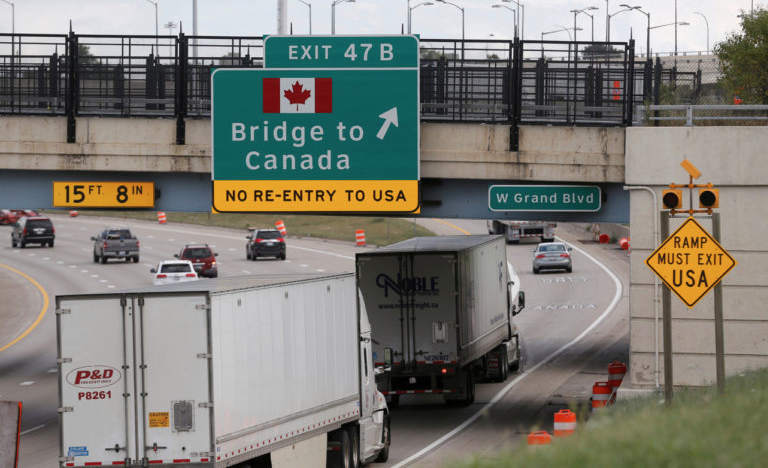
Living in the Detroit area offers a unique advantage, with Canada being just across the river. But that convenience also comes with challenges if you find yourself stopped by U.S. or Canadian border agents. Whether you’re crossing intentionally or accidentally, it’s essential to understand your rights and responsibilities before you go.
Required Documents to Cross the U.S.–Canadian Border
Before traveling, make sure you have the proper identification and proof of citizenship. Accepted documents include:
- A valid U.S. passport or passport card
- An Enhanced Driver’s License (EDL)
- Or other Trusted Traveler Program cards such as NEXUS
Border officers are increasingly strict about proper documentation. Under current federal directives enforced by the Trump administration, travelers who cannot provide proof of citizenship are more likely to face detention, questioning, or denial of entry.
Common Mistakes at the Detroit–Windsor Border
Never carry illegal drugs, firearms, or obscene materials when you are attempting to cross the border. If border agents think anything is suspicious, they are within legal authority to search your vehicle. Carrying such items can lead to serious criminal charges, fines, and imprisonment.
Many travelers accidentally cross into Canada due to confusing signage near the Ambassador Bridge or while driving for rideshare apps like Uber or Lyft. Because of GPS proximity, the apps may sometimes dispatch rides from the other side of the border without alerting the driver.
In early 2025, several Detroit-area residents were detained at the border after unintentionally entering Canada. Reports indicate that some were held for days without legal representation, even though they had no intention of crossing.
If you accidentally enter Canada, remain calm and cooperative. If you can prove your legal status, border agents will document your information and escort you back to U.S. territory. However, never sign any documents you don’t understand — instead, contact an immigration attorney immediately.
Border Detentions and Immigration Enforcement
Customs and Border Protection (CBP) facilities near Detroit were originally used for short-term detentions. But with new immigration policies in 2025 emphasizing mass deportations, these locations increasingly act as temporary holding centers.
Between January and March 2025 alone, more than 200 travelers were detained at the Canadian border, with 90% reportedly detained due to navigation mistakes. If detained, individuals are typically held at a short-term facility before being transferred to U.S. Immigration and Customs Enforcement (ICE).
Seeking Asylum in Canada: What You Should Know
A common misconception is that anyone can seek asylum in Canada to avoid U.S. immigration enforcement. It’s important to know that borderagents will not allow you to proceed if you already have a pending immigration case in the U.S.
You may be eligible to claim asylum in Canada if:
- You have close family members (parents, siblings, children, grandparents, or cousins) who are Canadian citizens, permanent residents, or refugee claimants.
- You are an unaccompanied minor (under 18) with no legal guardian in either country.
- You possess a valid Canadian visa, work permit, or study permit.
- You are facing the death penalty in your home country.
- You are a stateless person who has lived in the U.S. long-term.
If none of these apply, your attempt to cross the border for asylum could lead to temporary detainment and notification to U.S. immigration authorities.
How to Apply for a NEXUS Card for Faster Border Crossings
If you travel between Detroit and Canada frequently for work or to visit family, applying for a NEXUS card can save you hours of time. NEXUS is a Trusted Traveler Program that offers expedited processing for low-risk, pre-approved travelers.
How to Apply:
- Submit your application online at the Trusted Traveler Programs (TTP) website.
- Pay the non-refundable fee.
- Schedule and attend an in-person interview at an enrollment center.
Once approved, your membership lasts five years.
Your NEXUS application may be denied if you submit incomplete or false information on your application, have a criminal history or committed immigration/customs violations.
If your application is denied, you can appeal within 90 days. Work with an experienced immigration attorney to submit your appeal and include supporting documents like court dispositions or clearance letters.
Protect Yourself at the Border
The Detroit–Windsor border is one of the busiest crossings in North America, and even small mistakes can have serious legal consequences. Before traveling, double-check your documents, understand your legal rights, and consult an attorney if you face issues such as detainment, denial of entry, or NEXUS card rejection.
If you or a family member need information regarding a specific case or the assistance of experienced attorneys fighting for people like you every day, call our 24/7 English-Spanish line at 248.951.2450 or reach out to us at Atiya Law.
